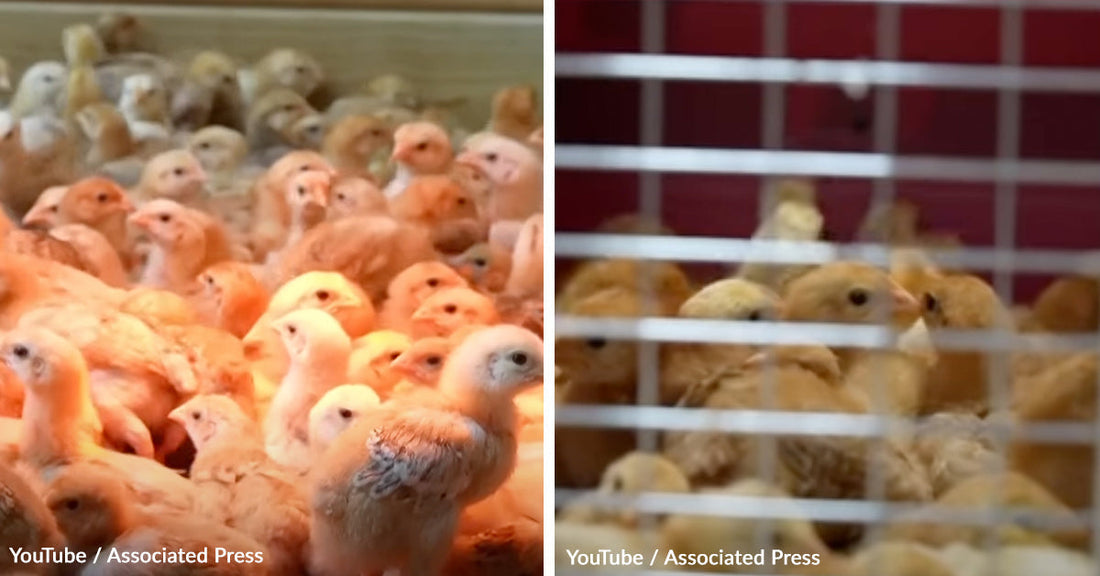Thousands of Baby Chicks Found Dead After Being Left in USPS Truck
Matthew Russell
Thousands of baby chicks were discovered trapped in a U.S. Postal Service truck at a Delaware distribution center, abandoned for three days without food, water, or ventilation.
By the time help arrived, roughly 4,000 had already died. The remaining 10,000 were rushed to First State Animal Center and SPCA in Camden, where shelter workers have since been locked in a desperate, round-the-clock effort to save the survivors.
The scope of the tragedy stunned even seasoned rescuers, CBS News reports. The truck, reportedly overlooked and parked in warm conditions, held crates soaked through from the bodies of dead chicks.
“It was a mess,” said shelter director John Parana.

Photo: YouTube / Associated Press
Over 12,000 baby chicks were shipped and never delivered.
An Overwhelmed Shelter Grapples With Unimaginable Numbers
Since the rescue, the shelter has transformed into a 24-hour emergency operation. Staff have worked without pause to stabilize the surviving chicks, which include young turkeys, geese, quail, and mostly Freedom Ranger chickens—a fast-growing breed often raised for meat.
No one knows the exact number of live birds still in their care.
“We can’t count them,” Parana told the Associated Press. “They’re too small, too fast, and there are too many.”
He estimates more than 2,000 still remain in the shelter’s converted livestock pens.
Only a few hundred chicks have been adopted. Despite national attention, some potential adopters have inquired about using the birds for meat—offers the shelter has rejected due to its no-kill policy.
The Hatchery’s Disappointment and the Postal Service’s Silence
The shipment originated from Pennsylvania-based Freedom Ranger Hatchery, which distributes chicks weekly to customers across the country. After discovering the shipment had stalled, the hatchery expected USPS to complete the delivery to their customers, who are equipped to receive and care for chicks in various stages of health.
“The recipients were prepared,” a spokesperson from the hatchery said in a statement to The New York Times. “Even sick or starving birds would have had a better chance there than in a truck.”
The company cited biosecurity protocols as the reason they could not take the birds back. Their frustration centers not only on the loss of life, but on the cascading harm to small family farms across the U.S. that were expecting deliveries.
Meanwhile, the U.S. Postal Service has acknowledged a “process breakdown” and is conducting an internal investigation, CNN reports. “Established procedures” exist for transporting live poultry, USPS claims, but no one has explained how or why this shipment went undelivered.
According to the USPS website, chicks can survive for up to 72 hours without food or water post-hatch—an upper limit that this shipment clearly exceeded.

Photo: YouTube / Associated Press
Thousands of chicks died without food, water, or air circulation.
Mounting Costs, Delayed Relief
Caring for thousands of rapidly growing birds has become financially unsustainable for the shelter, which relies heavily on donations. Feed, space, staffing—all of it now strained. Employees have begun paying out of pocket. Every additional day drives up expenses.
The Delaware Department of Agriculture, which directed the chicks to the shelter after USPS reported them, initially indicated they would support the shelter financially. A standard reimbursement rate of $5 per chick per day was discussed—but quickly deemed unfeasible given the scale of the crisis.
“They told us they’re trying to go after the post office for reimbursement,” Parana told The Hartford Courant. “That doesn’t help us in the meantime.”
Where the Crisis Goes From Here
The shelter continues to plead for community help, both in the form of adoptions and donations. But even with all the goodwill in the world, the clock is ticking. Freedom Ranger chicks grow quickly, and the need for larger enclosures, more food, and expanded veterinary oversight grows with them.
The birds were originally bound for farms in multiple states, including Texas, Ohio, Florida, and Washington, according to The New York Times. Now, instead of serving their intended purpose, they’re living out a second, unplanned chapter in a Delaware shelter that was never meant to host them.
Their survival, ironically, now depends on the kindness of strangers, and the resolution of a breakdown no one has yet been able to explain.
Click below to make a difference.
Click below to make a difference.

